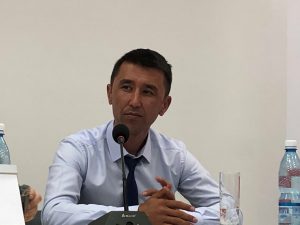The Government of the Kyrgyz Republic and USAID announced major advancements in the fight against the ongoing tuberculosis epidemic in the country. New life-saving treatments are showing promising results only two years following the introduction of new drugs and treatment courses for patients with severe forms of tuberculosis. This is done by the USAID funded, KNCV Tuberculosis Foundation led Challenge TB program.
The Director of the National TB Program, Abdullaat Kadyrov, stated at a press conference in Bishkek that nearly 80 percent of all patients were successfully cured after using a new shorter treatment for multidrug-resistant tuberculosis – which indicates a major improvement in comparison to the stark outcomes of the previous treatment model, which cured only 53 percent of patients. Kadyrov added that patients with extensively drug-resistant tuberculosis (which are the most lethal and hardest to treat forms of the disease) who were on new drugs had also been successfully cured.
Until recently, many patients with drug-resistant forms of tuberculosis were left helpless in their fight against the disease, even after going through two years of treatment that included daily injections and over 14,000 pills over the treatment period – suffering from significant side effects all the while. The successful outcomes of that treatment, however difficult, were only one in two patients with multidrug-resistant tuberculosis; and only one in ten with extensively drug-resistant tuberculosis.
The new treatment models are not only more effective in curing the disease, but they are also easier for patients to follow. The new drugs have fewer side effects. For patients with multidrug-resistant tuberculosis, the treatment is shorter: between nine and 12 months, instead of 24.
Groundbreaking treatments
In 2017, the Challenge TB project and the National TB Program of the Kyrgyz Republic started working together to introduce these new and groundbreaking treatments. The Kyrgyz Republic is one of the first countries in the world to provide free and full access to these new treatments for all of its patients.
Given that the Kyrgyz Republic is among the 30 countries with the highest levels of drug-resistant tuberculosis in the world, these new, more effective drugs and treatment courses are poised to save thousands of lives across the country. “The success rate can also be attributed to the introduction of a patient centered model with case managers. They are in close contact with the patients on a daily basis,” adds Bakyt Myrzaliev, country director of KNCV Kyrgyzstan.
Before the new treatments and the case management model was introduced, 23 percent of patients did not complete their treatment in general cohorts. This gap has been now decreased to 7 percent in Challenge TB cohorts. Myrzaliev: “This is because the new treatments have less side-effects and short treatment regimens are available. The case managers inspire, educate and support patients to commit to complete the treatment.”

A TB survivor – the young surgeon Ilhomjon Abdukarymov – also pressed the importance of the patient centered approach: “I would especially like to thank USAID and KNCV for the way in which they very quickly respond to TB cases. They visit every patient in Kyrgyzstan, talk face to face and give lots of support.”

